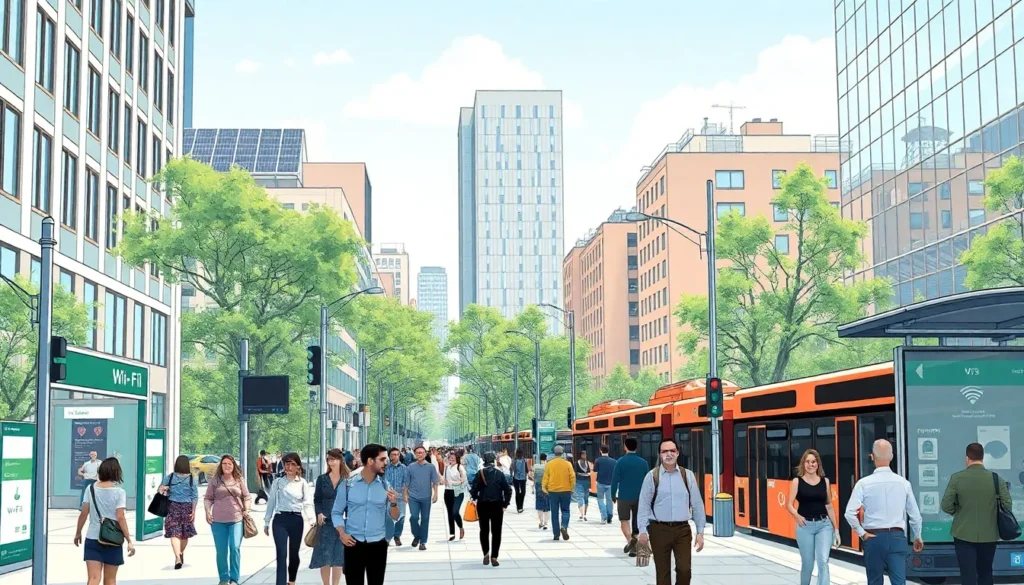Imagine a city where traffic jams are a thing of the past, energy is used wisely, and your morning coffee is brewed just as you step out the door. Welcome to the world of smart city technology, where innovation meets urban living. This isn’t just science fiction; it’s happening now, transforming the way people live, work, and play.
Table of Contents
ToggleOverview of Smart City Technology
Smart city technology encompasses various systems and tools designed to enhance urban living. It employs data analytics, internet of things (IoT), and artificial intelligence (AI) to improve city services. Many cities use smart traffic management systems to reduce congestion and optimize transit routes, making commutes faster and more efficient.
Energy usage benefits significantly from smart technology. Smart grids allow cities to monitor and manage energy consumption in real-time. These innovations facilitate renewable energy integration, promoting sustainability and reducing carbon footprints.
Waste management also sees improvement. Smart bins equipped with sensors alert waste management teams when they need collection. This approach lowers operational costs and ensures cleaner urban environments.
Public safety enhances through the use of surveillance cameras and AI analytics. Smart technologies enable rapid responses to incidents by monitoring streets and public spaces for unusual activity. This capability helps law enforcement agencies respond to emergencies more effectively.
Citizen engagement grows with smart city applications. Many cities implement mobile apps for residents to access services, report issues, or participate in community projects. These tools foster stronger community connections and improve overall satisfaction with city management.
Governments and private sectors collaborate to develop smart city solutions. Partnerships between startups and municipalities often lead to innovative projects that address specific urban challenges. Together, they create livable urban spaces that promote sustainable growth and improve daily life.
Key Components of Smart Cities

Smart city technology relies on several essential components that drive efficiency and enhance quality of life. These elements work synergistically to create smarter, more sustainable urban environments.
IoT and Connectivity
IoT devices play a critical role in smart cities. Sensors throughout urban areas collect real-time data on traffic, air quality, and energy consumption. Connectivity allows these devices to communicate seamlessly, enabling better resource management. Cities utilize smart streetlights that adjust brightness based on pedestrian movement, contributing to energy conservation. Furthermore, public Wi-Fi networks support citizen engagement, providing residents with access to information and services anytime. This interconnectedness fosters a more responsive urban ecosystem.
Data Management and Analytics
Data management forms the backbone of smart city initiatives. Cities collect vast amounts of data from various sources, including IoT devices and social media platforms. Analytics tools process this information, providing actionable insights for urban planners. Efficient data management leads to improved decision-making regarding traffic patterns and emergency services. For example, predictive analytics can optimize public transport schedules, reducing wait times for commuters. They embrace data-driven strategies to enhance city operations and promote transparency.
Sustainable Infrastructure
Sustainable infrastructure is integral to the smart city framework. Green buildings equipped with energy-efficient technologies reduce the carbon footprint. Innovations in renewable energy sources, such as solar panels on rooftops, support sustainability goals. Cities implement smart grids that adapt to fluctuations in power demand, ensuring reliable energy supply. Public transportation options, like electric buses, further minimize emissions. This commitment to sustainability transforms urban landscapes into more resilient and livable environments.
Benefits of Smart City Technology
Smart city technology offers numerous advantages that significantly enhance urban living. Improved efficiency and quality of life become apparent as cities adopt these innovations.
Enhanced Public Services
Enhanced public services emerge with the integration of smart technology. Citizens experience faster access to resources through mobile applications that provide real-time information. Improved waste management systems utilize smart bins that notify collection teams when full, leading to timely pickups. Public transit benefits from data-driven insights that optimize routes and schedules, resulting in reduced waiting times and improved reliability. Seamless online platforms streamline interactions with city agencies, making it easier for residents to report issues or access services.
Improved Public Safety
Improved public safety represents a key outcome of smart city initiatives. Surveillance systems equipped with AI capabilities monitor public areas and detect unusual activities swiftly. Timely responses become possible as emergency services receive immediate alerts and analytics. Real-time communication tools help officials disseminate crucial information, like severe weather warnings, to residents without delay. Community engagement also rises, thanks to platforms that encourage citizen feedback on safety concerns, fostering collaboration between residents and law enforcement.
Economic Growth
Economic growth flourishes as smart city technology creates a thriving environment for businesses. Innovative infrastructure attracts investments, leading to job creation and improved local economies. Enhanced efficiency in transport and logistics lowers operation costs for businesses, making cities more competitive. Increased connectivity empowers entrepreneurs to tap into new markets, expanding their reach. Sustainable practices draw eco-conscious companies to urban areas, contributing to a dynamic and diverse economic landscape.
Challenges in Implementing Smart City Technology
Implementing smart city technology presents several challenges that urban planners and governments must address. These challenges include privacy and security issues, as well as high implementation costs.
Privacy and Security Concerns
Privacy and security concerns significantly impact the deployment of smart city technologies. Many smart devices collect vast amounts of personal data, raising apprehensions about data protection and misuse. Citizens often fear surveillance and unauthorized access to their information. Effective measures are crucial for securing sensitive data, requiring robust encryption and cybersecurity protocols. Governments must establish clear regulations to ensure transparency in data usage. Engaging citizens in discussions about privacy can create trust and foster cooperation in smart initiatives.
High Implementation Costs
High implementation costs pose a significant hurdle for cities adopting smart technology. Initial investments in infrastructure, technology, and training can be substantial. Cities often face limited budgets, leading to challenges in prioritizing smart initiatives. Many require partnerships with private companies to distribute costs and share expertise. Funding from government grants and public-private partnerships can help alleviate financial burdens. Economic analysis of long-term savings is essential for justifying upfront expenditures, demonstrating the potential return on investment from smart technology.
Case Studies of Successful Smart Cities
Several cities exemplify the effective implementation of smart city technology, showcasing its transformative impact on urban living.
Example City 1
Barcelona, Spain, stands at the forefront of smart city initiatives. The city utilizes a smart traffic management system that significantly reduces congestion. Real-time data collected from sensors enables efficient rerouting of vehicles, shortening commute times. Moreover, smart streetlights adjust brightness according to pedestrian activity, which enhances energy conservation. Public Wi-Fi networks provide easy access to information and foster community engagement. This connected environment promotes sustainability and increases overall quality of life for residents.
Example City 2
Singapore exemplifies another successful smart city, emphasizing innovation in its urban planning. Intelligent mobility solutions facilitate seamless public transportation, enabling commuters to access real-time schedules and availability. The city’s extensive sensor network monitors air quality, allowing officials to address pollution issues proactively. Smart waste management systems, equipped with sensors, alert collection teams when bins are full, optimizing operational efficiency. These technologies contribute to a cleaner and more sustainable urban environment, setting a benchmark for others to follow.
Future Trends in Smart City Technology
Emerging trends in smart city technology focus on enhanced integration of artificial intelligence and machine learning to better manage urban resources. Advanced algorithms analyze data from interconnected IoT devices, allowing cities to adapt services in real-time based on usage patterns. Cities increasingly implement digital twin technology, creating virtual replicas of urban environments for improved planning and decision-making.
Growing dependence on renewable energy sources shapes smart city initiatives, with an emphasis on smart grids that efficiently integrate solar and wind energy. Smart buildings equipped with energy management systems optimize consumption and reduce waste, contributing to sustainability goals. Increased investment in 5G networks boosts connectivity, enabling faster communication between devices and enhancing the functionality of IoT applications.
Smart mobility solutions gain traction, with cities exploring autonomous vehicles and on-demand transit services that reduce congestion. Mobility-as-a-Service (MaaS) platforms integrate various forms of transportation into a single accessible service, enhancing user convenience. Real-time data collected from vehicular networks allows cities to fine-tune traffic signals and reduce delays.
Enhanced citizen participation emerges through mobile applications and online platforms that facilitate feedback on city services. Transparent communication channels between governments and residents improve trust and foster community engagement. Innovative public-private partnerships provide collaborative frameworks that drive smart city developments, addressing urban challenges effectively.
Investments in cybersecurity strengthen the protection of sensitive data. With privacy concerns rising, cities prioritize robust security measures for the safe deployment of smart technologies. Future smart cities focus on creating resilient infrastructure, ensuring not only sustainability but also the safety of their residents through improved public safety mechanisms.
Smart city technology is reshaping urban landscapes and enhancing the quality of life for residents. As cities embrace innovative solutions like IoT devices and AI analytics, they create more efficient public services and sustainable environments. The collaboration between governments and private sectors is vital for overcoming challenges like privacy concerns and high implementation costs.
Future developments will likely focus on integrating advanced technologies and renewable energy sources, ensuring cities remain resilient and adaptable. With ongoing investments and citizen engagement, smart cities will continue to evolve, fostering vibrant communities that prioritize both sustainability and livability.





